王佐良的翻译思想研究
- 格式:doc
- 大小:219.00 KB
- 文档页数:40
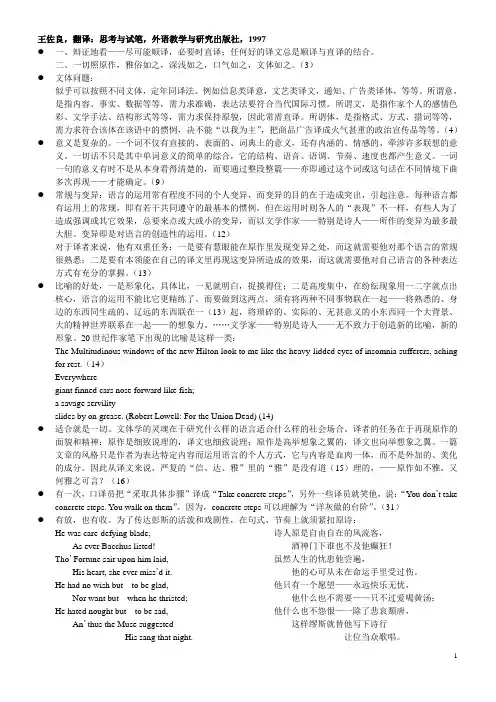
王佐良,翻译:思考与试笔,外语教学与研究出版社,1997●一、辩证地看——尽可能顺译,必要时直译;任何好的译文总是顺译与直译的结合。
二、一切照原作,雅俗如之,深浅如之,口气如之,文体如之。
(3)●文体问题:似乎可以按照不同文体,定年同译法。
例如信息类译意,文艺类译文,通知、广告类译体,等等。
所谓意,是指内容、事实、数据等等,需力求准确,表达法要符合当代国际习惯。
所谓文,是指作家个人的感情色彩、文学手法、结构形式等等,需力求保持原貌,因此常需直译。
所谓体,是指格式、方式、措词等等,需力求符合该体在该语中的惯例,决不能“以我为主”,把商品广告译成火气甚重的政治宣传品等等。
(4)●意义是复杂的。
一个词不仅有直接的、表面的、词典土的意义,还有内涵的、情感的、牵涉许多联想的意义。
一切话不只是其中单词意义的简单的综合,它的结构、语音、语调、节奏、速度也都产生意义。
一词一句的意义有时不是从本身看得清楚的,而要通过整段整篇——亦即通过这个词或这句话在不同情境下曲多次再现——才能确定。
(9)●常规与变异:语言的运用常有程度不同的个人变异,而变异的目的在于造成突出,引起注意。
每种语言都有运用上的常规,即有若干共同遵守的最基本的惯例,但在运用时则各人的“表现”不一样,有些人为了造成强调或其它效果,总要来点或大或小的变异,而以文学作家——特别是诗人——所作的变异为最多最大胆。
变异即是对语言的创造性的运用。
(12)对于译者来说,他有双重任务:一是要有慧眼能在原作里发现变异之处,而这就需要他对那个语言的常规很熟悉;二是要有本领能在自己的译文里再现这变异所造成的效果,而这就需要他对自己语言的各种表达方式有充分的掌握。
(13)●比喻的好处,一是形象化,具体比,一见就明白,捉摸得住;二是高度集中,在纷纭现象用一二字就点出核心,语言的运用不能比它更精练了。
而要做到这两点,须有将两种不同事物联在一起——将熟悉的、身边的东西同生疏的、辽远的东西联在一(13)起,将琐碎的、实际的、无甚意义的小东西同一个大背景、大的精神世界联系在一起——的想象力。
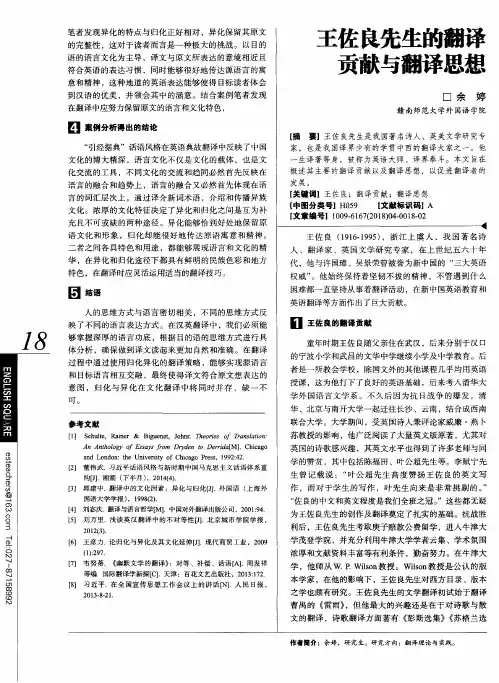
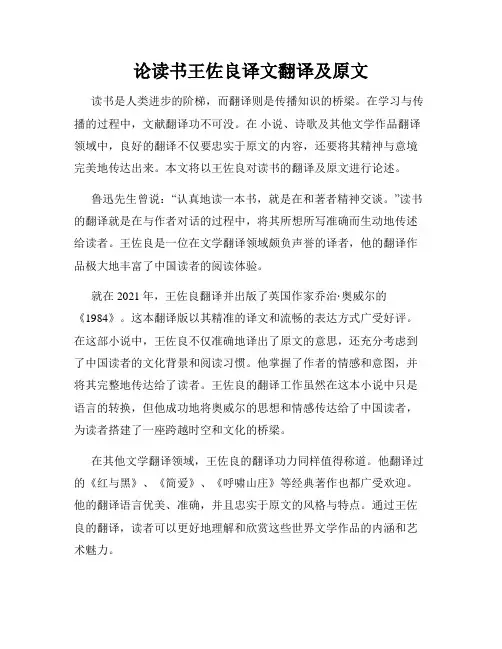
论读书王佐良译文翻译及原文读书是人类进步的阶梯,而翻译则是传播知识的桥梁。
在学习与传播的过程中,文献翻译功不可没。
在小说、诗歌及其他文学作品翻译领域中,良好的翻译不仅要忠实于原文的内容,还要将其精神与意境完美地传达出来。
本文将以王佐良对读书的翻译及原文进行论述。
鲁迅先生曾说:“认真地读一本书,就是在和著者精神交谈。
”读书的翻译就是在与作者对话的过程中,将其所想所写准确而生动地传述给读者。
王佐良是一位在文学翻译领域颇负声誉的译者,他的翻译作品极大地丰富了中国读者的阅读体验。
就在2021年,王佐良翻译并出版了英国作家乔治·奥威尔的《1984》。
这本翻译版以其精准的译文和流畅的表达方式广受好评。
在这部小说中,王佐良不仅准确地译出了原文的意思,还充分考虑到了中国读者的文化背景和阅读习惯。
他掌握了作者的情感和意图,并将其完整地传达给了读者。
王佐良的翻译工作虽然在这本小说中只是语言的转换,但他成功地将奥威尔的思想和情感传达给了中国读者,为读者搭建了一座跨越时空和文化的桥梁。
在其他文学翻译领域,王佐良的翻译功力同样值得称道。
他翻译过的《红与黑》、《简爱》、《呼啸山庄》等经典著作也都广受欢迎。
他的翻译语言优美、准确,并且忠实于原文的风格与特点。
通过王佐良的翻译,读者可以更好地理解和欣赏这些世界文学作品的内涵和艺术魅力。
然而,对于一个翻译者来说,选择合适的译文也是一项挑战。
在进行文学翻译时,翻译者需要全面了解原文的语言、风格和文化特点。
王佐良在选择和翻译文学作品时,注重在原文的基础上增加其翻译的可读性,并在尊重原著的前提下,适当增添或删减一些内容,以使译文更适合目标读者。
他的翻译作品不仅保留了原文的风格和内涵,还结合了中国读者的口味和阅读习惯,为读者提供了一种贴近他们生活经验的阅读体验。
当然,作为一位杰出的译者,王佐良的翻译工作并非完美无缺。
在某些时候,由于文化差异或其他原因,完全忠实于原文可能无法满足目标读者的需求。
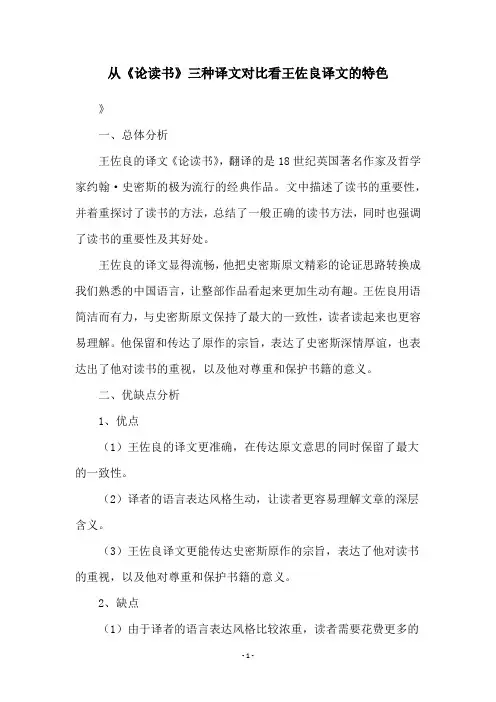
从《论读书》三种译文对比看王佐良译文的特色
》
一、总体分析
王佐良的译文《论读书》,翻译的是18世纪英国著名作家及哲学家约翰·史密斯的极为流行的经典作品。
文中描述了读书的重要性,并着重探讨了读书的方法,总结了一般正确的读书方法,同时也强调了读书的重要性及其好处。
王佐良的译文显得流畅,他把史密斯原文精彩的论证思路转换成我们熟悉的中国语言,让整部作品看起来更加生动有趣。
王佐良用语简洁而有力,与史密斯原文保持了最大的一致性,读者读起来也更容易理解。
他保留和传达了原作的宗旨,表达了史密斯深情厚谊,也表达出了他对读书的重视,以及他对尊重和保护书籍的意义。
二、优缺点分析
1、优点
(1)王佐良的译文更准确,在传达原文意思的同时保留了最大的一致性。
(2)译者的语言表达风格生动,让读者更容易理解文章的深层含义。
(3)王佐良译文更能传达史密斯原作的宗旨,表达了他对读书的重视,以及他对尊重和保护书籍的意义。
2、缺点
(1)由于译者的语言表达风格比较浓重,读者需要花费更多的
时间去理解文章的意义,这可能会影响到读者对译文的阅读速度。
(2)有时,王佐良的译文可能会偏离原文的主要意图,增加了读者理解文章的难度。
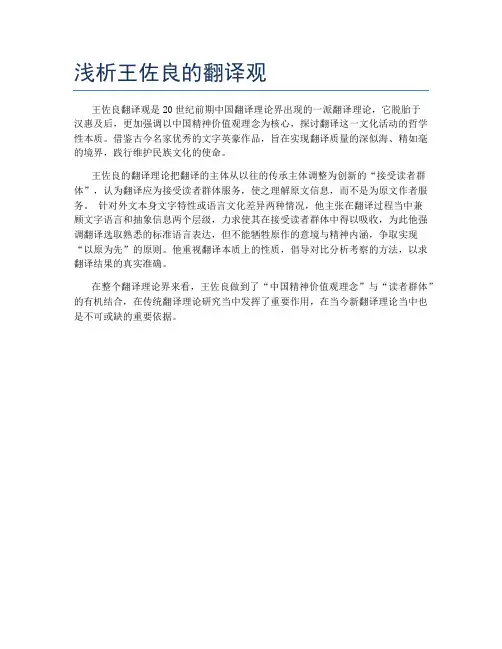
浅析王佐良的翻译观
王佐良翻译观是20世纪前期中国翻译理论界出现的一派翻译理论,它脱胎于
汉惠及后,更加强调以中国精神价值观理念为核心,探讨翻译这一文化活动的哲学性本质。
借鉴古今名家优秀的文字英豪作品,旨在实现翻译质量的深似海、精如毫的境界,践行维护民族文化的使命。
王佐良的翻译理论把翻译的主体从以往的传承主体调整为创新的“接受读者群体”,认为翻译应为接受读者群体服务,使之理解原文信息,而不是为原文作者服务。
针对外文本身文字特性或语言文化差异两种情况,他主张在翻译过程当中兼
顾文字语言和抽象信息两个层级,力求使其在接受读者群体中得以吸收,为此他强调翻译选取熟悉的标准语言表达,但不能牺牲原作的意境与精神内涵,争取实现“以原为先”的原则。
他重视翻译本质上的性质,倡导对比分析考察的方法,以求翻译结果的真实准确。
在整个翻译理论界来看,王佐良做到了“中国精神价值观理念”与“读者群体”的有机结合,在传统翻译理论研究当中发挥了重要作用,在当今新翻译理论当中也是不可或缺的重要依据。
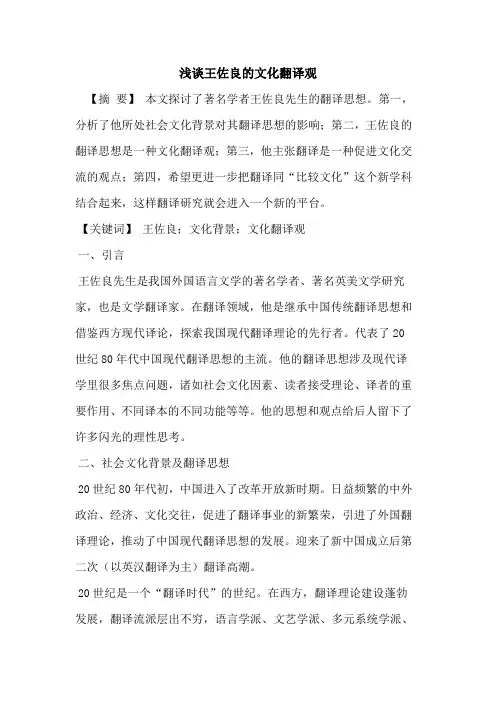
浅谈王佐良的文化翻译观【摘要】本文探讨了著名学者王佐良先生的翻译思想。
第一,分析了他所处社会文化背景对其翻译思想的影响;第二,王佐良的翻译思想是一种文化翻译观;第三,他主张翻译是一种促进文化交流的观点;第四,希望更进一步把翻译同“比较文化”这个新学科结合起来,这样翻译研究就会进入一个新的平台。
【关键词】王佐良;文化背景;文化翻译观一、引言王佐良先生是我国外国语言文学的著名学者、著名英美文学研究家,也是文学翻译家。
在翻译领域,他是继承中国传统翻译思想和借鉴西方现代译论,探索我国现代翻译理论的先行者。
代表了20世纪80年代中国现代翻译思想的主流。
他的翻译思想涉及现代译学里很多焦点问题,诸如社会文化因素、读者接受理论、译者的重要作用、不同译本的不同功能等等。
他的思想和观点给后人留下了许多闪光的理性思考。
二、社会文化背景及翻译思想20世纪80年代初,中国进入了改革开放新时期。
日益频繁的中外政治、经济、文化交往,促进了翻译事业的新繁荣,引进了外国翻译理论,推动了中国现代翻译思想的发展。
迎来了新中国成立后第二次(以英汉翻译为主)翻译高潮。
20世纪是一个“翻译时代”的世纪。
在西方,翻译理论建设蓬勃发展,翻译流派层出不穷,语言学派、文艺学派、多元系统学派、描写学派、文化学派、综合学派、解构主义学派、后殖民主义学派等,呈现出一派多元化发展的景观。
尤其是近30年来,西方翻译学逐渐摆脱了“从属”的地位,发展成为一门独立的严肃学科。
而影响整个西方现代翻译思想发展历史进程的译论泰斗如:奈达、卡特福德、威尔斯、纽马克等同样对我国现代翻译思想的发展也产生了重要的影响。
20世纪末期,随着中国在世界舞台上扮演着愈加重要的角色以及王佐良自己渐渐取得的成就,这些内因和外因使得他能在翻译理论中体现其人文关怀。
但是他的民族意识不是狭隘的民族主义,而是寻求建立中国的文化身份,以及世界文化的共存和发展。
受国内社会背景及国外翻译思想的影响,王佐良先生率先提出以文化视角研究翻译。
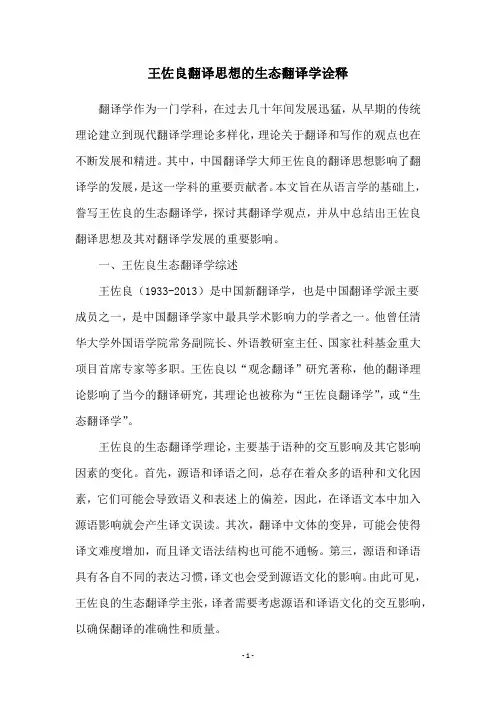
王佐良翻译思想的生态翻译学诠释翻译学作为一门学科,在过去几十年间发展迅猛,从早期的传统理论建立到现代翻译学理论多样化,理论关于翻译和写作的观点也在不断发展和精进。
其中,中国翻译学大师王佐良的翻译思想影响了翻译学的发展,是这一学科的重要贡献者。
本文旨在从语言学的基础上,誊写王佐良的生态翻译学,探讨其翻译学观点,并从中总结出王佐良翻译思想及其对翻译学发展的重要影响。
一、王佐良生态翻译学综述王佐良(1933-2013)是中国新翻译学,也是中国翻译学派主要成员之一,是中国翻译学家中最具学术影响力的学者之一。
他曾任清华大学外国语学院常务副院长、外语教研室主任、国家社科基金重大项目首席专家等多职。
王佐良以“观念翻译”研究著称,他的翻译理论影响了当今的翻译研究,其理论也被称为“王佐良翻译学”,或“生态翻译学”。
王佐良的生态翻译学理论,主要基于语种的交互影响及其它影响因素的变化。
首先,源语和译语之间,总存在着众多的语种和文化因素,它们可能会导致语义和表述上的偏差,因此,在译语文本中加入源语影响就会产生译文误读。
其次,翻译中文体的变异,可能会使得译文难度增加,而且译文语法结构也可能不通畅。
第三,源语和译语具有各自不同的表达习惯,译文也会受到源语文化的影响。
由此可见,王佐良的生态翻译学主张,译者需要考虑源语和译语文化的交互影响,以确保翻译的准确性和质量。
二、王佐良翻译思想及其影响王佐良的生态翻译学理论,有着其特殊的翻译思想。
首先,王佐良强调“人性主义”,认为译者本质上是一个“能够理解双方文化的处女”,既要尊重源文,又要维护译文的质量,因此,要做到翻译的准确无误,就要考虑源译文之间的文化差异,根据不同文化的习惯来调整语言,以便进行准确的翻译。
其次,王佐良提出“平衡原则”,认为译者应该在有效的传达源语文本信息的基础上,尽可能保留源语文化表达的特色,以增进跨文化理解,从而达到翻译精度和质量的最佳水平。
三、王佐良翻译思想对翻译学发展的影响王佐良的生态翻译学理论,不仅对当今翻译学研究有着重大影响,还在翻译学训练上有着深远意义。
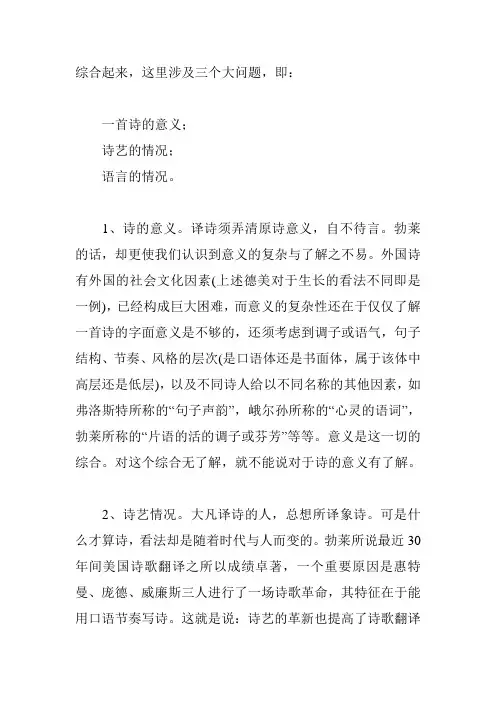
综合起来,这里涉及三个大问题,即:一首诗的意义;诗艺的情况;语言的情况。
1、诗的意义。
译诗须弄清原诗意义,自不待言。
勃莱的话,却更使我们认识到意义的复杂与了解之不易。
外国诗有外国的社会文化因素(上述德美对于生长的看法不同即是一例),已经构成巨大困难,而意义的复杂性还在于仅仅了解一首诗的字面意义是不够的,还须考虑到调子或语气,句子结构、节奏、风格的层次(是口语体还是书面体,属于该体中高层还是低层),以及不同诗人给以不同名称的其他因素,如弗洛斯特所称的“句子声韵”,峨尔孙所称的“心灵的语词”,勃莱所称的“片语的活的调子或芬芳”等等。
意义是这一切的综合。
对这个综合无了解,就不能说对于诗的意义有了解。
2、诗艺情况。
大凡译诗的人,总想所译象诗。
可是什么才算诗,看法却是随着时代与人而变的。
勃莱所说最近30年间美国诗歌翻译之所以成绩卓著,一个重要原因是惠特曼、庞德、威廉斯三人进行了一场诗歌革命,其特征在于能用口语节奏写诗。
这就是说:诗艺的革新也提高了诗歌翻译的质量。
美国诗从惠特曼起走出了一条不同于英国诗的道路是公认的事实,译诗方面成果累累也有目共睹,两者之间显然有关,只是其紧密程度究竟如何需要进一步研究而已。
在我们中国,也有一种类似的发展,即在五四以后白话诗登场,诗艺经过了重大变革之后,外国诗的翻译才繁荣起来。
3、语言情况。
只要动笔,就离不开语言。
但是一种语言有处于比较停滞的时候,也有处于比较活跃的时候。
比较活跃,有利于翻译。
英国翻译的盛日之一是16、17世纪伊丽莎白一世时期,正是英语变动较多、大量吸收外来成分的时期。
中国语言在五四新文化运动期间也处于比较活跃时期,其标志之一是在文学写作中白话代替了文言,这也为翻译带来了一个活动频仍、成果丰硕的繁朵时期。
就译者个人说,他必须对于语言有足够的敏感,必须认识它的特点,层次,精华所在,弱点所在,它的过去与现在,有哪些事是它乐于做也善于做的,又有哪些是它不愿意做也做不好的,特别在它处于比较活跃、变动较多的时候更需有清楚的认识。

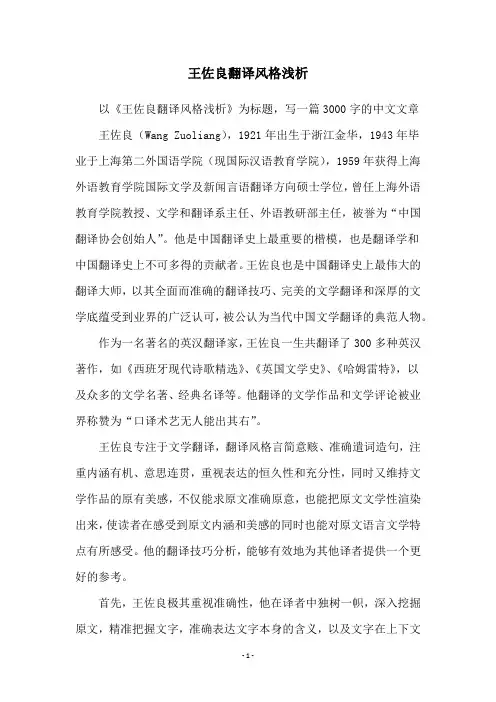
王佐良翻译风格浅析以《王佐良翻译风格浅析》为标题,写一篇3000字的中文文章王佐良(Wang Zuoliang),1921年出生于浙江金华,1943年毕业于上海第二外国语学院(现国际汉语教育学院),1959年获得上海外语教育学院国际文学及新闻言语翻译方向硕士学位,曾任上海外语教育学院教授、文学和翻译系主任、外语教研部主任,被誉为“中国翻译协会创始人”。
他是中国翻译史上最重要的楷模,也是翻译学和中国翻译史上不可多得的贡献者。
王佐良也是中国翻译史上最伟大的翻译大师,以其全面而准确的翻译技巧、完美的文学翻译和深厚的文学底蕴受到业界的广泛认可,被公认为当代中国文学翻译的典范人物。
作为一名著名的英汉翻译家,王佐良一生共翻译了300多种英汉著作,如《西班牙现代诗歌精选》、《英国文学史》、《哈姆雷特》,以及众多的文学名著、经典名译等。
他翻译的文学作品和文学评论被业界称赞为“口译术艺无人能出其右”。
王佐良专注于文学翻译,翻译风格言简意赅、准确遣词造句,注重内涵有机、意思连贯,重视表达的恒久性和充分性,同时又维持文学作品的原有美感,不仅能求原文准确原意,也能把原文文学性渲染出来,使读者在感受到原文内涵和美感的同时也能对原文语言文学特点有所感受。
他的翻译技巧分析,能够有效地为其他译者提供一个更好的参考。
首先,王佐良极其重视准确性,他在译者中独树一帜,深入挖掘原文,精准把握文字,准确表达文字本身的含义,以及文字在上下文中的具体用法。
他特别擅长将英语的实际用语转译为中文,并增添一些额外的语言技巧,以便让译文更加准确,让意思更加明确。
其次,王佐良能够运用语言技巧恰到好处地表达原文表达技巧,比如在翻译英语谚语、格言、俚语等英语中的文学表达技巧时,他会结合中文的文学表达技巧,用中文传达英文的表达技巧,从而让译文的文学美感不至于受到影响。
他还擅长用一句话表达多种意思或用一个中文词表达英语中的多个单词,使原文的内容简洁而完整地表达出来。
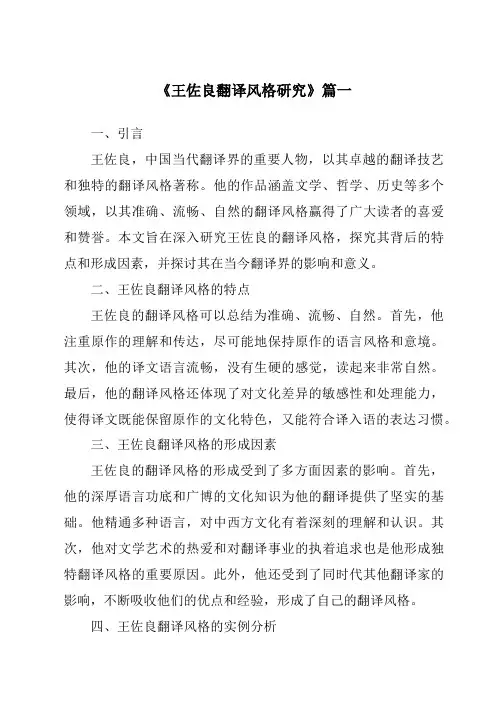
《王佐良翻译风格研究》篇一一、引言王佐良,中国当代翻译界的重要人物,以其卓越的翻译技艺和独特的翻译风格著称。
他的作品涵盖文学、哲学、历史等多个领域,以其准确、流畅、自然的翻译风格赢得了广大读者的喜爱和赞誉。
本文旨在深入研究王佐良的翻译风格,探究其背后的特点和形成因素,并探讨其在当今翻译界的影响和意义。
二、王佐良翻译风格的特点王佐良的翻译风格可以总结为准确、流畅、自然。
首先,他注重原作的理解和传达,尽可能地保持原作的语言风格和意境。
其次,他的译文语言流畅,没有生硬的感觉,读起来非常自然。
最后,他的翻译风格还体现了对文化差异的敏感性和处理能力,使得译文既能保留原作的文化特色,又能符合译入语的表达习惯。
三、王佐良翻译风格的形成因素王佐良的翻译风格的形成受到了多方面因素的影响。
首先,他的深厚语言功底和广博的文化知识为他的翻译提供了坚实的基础。
他精通多种语言,对中西方文化有着深刻的理解和认识。
其次,他对文学艺术的热爱和对翻译事业的执着追求也是他形成独特翻译风格的重要原因。
此外,他还受到了同时代其他翻译家的影响,不断吸收他们的优点和经验,形成了自己的翻译风格。
四、王佐良翻译风格的实例分析以王佐良翻译的《傲慢与偏见》为例,我们可以看到他的翻译风格的具体体现。
首先,他准确传达了原作的语言风格和情感色彩,使得译文在情感上与原作保持了一致。
其次,他的译文语言流畅,句式结构合理,没有生硬的感觉。
此外,他还对原文中的一些文化元素进行了适当的解释和说明,使得译文能够更好地理解和接受。
在处理原文中的修辞手法时,他也充分考虑了中英文的表达习惯和文化差异,使得译文既保留了原作的风格特点,又符合中文的表达习惯。
五、王佐良翻译风格的影响与意义王佐良的翻译风格对当今的翻译界产生了深远的影响。
首先,他的准确、流畅、自然的翻译风格为后来的译者提供了宝贵的借鉴和参考。
其次,他对文化差异的敏感性和处理能力使得他的译文能够更好地传达原作的文化内涵和价值观念。
英语语言文学论文:文学翻译家王佐良研究英语语言文学论文:文学翻译家王佐良研究【中文摘要】王佐良先生不仅是一位著名的教育家,英国文学研究界权威、比较文学研究开拓者,杰出的语言学家,出色的作家、诗人,而且是一位卓越的翻译家、翻译理论家。
王佐良将数以大量的的中国优秀古典、现代和当代文学作品译介给了西方读者,同时王佐良将许多优秀的世界文学作品翻译介绍给了中国读者,为中国翻译事业的发展做出了重大贡献。
不仅如此,王佐良在翻译理论方面也很有建树。
翻译活动伴随了王佐良一生的文学研究生涯,他在一边翻译一边思考中不断总结自己的翻译主张,提出了自己独到的翻译主张。
他所提出的翻译主张汇成了自成体系、颇具前瞻性的翻译思想,主要包括他的文化翻译观,文体翻译观和译诗观和外国文学史的编纂思想。
因此王佐良及其翻译理论与实践值得我们深入的研究。
王佐良是中国当代著名的翻译家和翻译理论家。
本文在广泛收集前人研究成果的基础上,以多元系统论和阐释学为理论框架,旨在对王佐良的翻译活动和翻译思想做一个全面的系统的梳理和描述,论述了王佐良翻译的地位和经典性,详细论述了王佐良四个方面的翻译思想,主要包括他的文化翻译观,文体翻译观和译诗观和外国文学史的编纂思想。
本文试图找出翻译思想的渊源、内涵、发展、特点及意义,以期人们对这位理论家的观点有...【英文摘要】Wang Zuoliang is a renowned educator, theauthority of British literature studies circle, theinaugurator of comparative literature studies, an outstanding linguist, an excellent writer and poet and most importantly he is a prominent translator and a translation theoretician. Wang Zuoliang has translated and introduced plenty of excellent Chinese classical, modern,contemporary literary works to Western readers. Meanwhile, Wang Zuoliang has translated and introduced a large number of foreign literaryworks ...【关键词】王佐良翻译思想翻译实践多元系统论阐释学【英文关键词】Wang Zuoliang translation theoriestranslation practice Polysystem Theory Hermeneutics【目录】文学翻译家王佐良研究ACKNOWLEDGEMENTS 5-6 摘要6-7 Abstract 7-8 1. Introduction 11-15 1.1 The Research Background11-12 1.2 The Objective and Significance of the Research 12-13 1.3 Research Methodology and Data Collection 13 1.4 The Structure of the Thesis 13-15 2. Literature Review 15-23 2.1 Previous Studies on Polysystem Theory 15-18 2.2 Previous Studies on Hermeneutics 18-20 2.3 Previous Studies on Translator Wang Zuoliang 20-23 3. Theoretical Framework 23-31 3.1 A Brief Introduction of the Polysystem Theory 23 3.2 Some Essentials of Even-Zohar’s Polysystem Theory 23-27 3.2.1 TheCanonized and Non-canonized Strata 23-24 3.2.2 Repertoire 24-253.2.3 Static and DynamicCanonicity 25 3.2.4 Central and PeripheralPosition 25-26 3.2.5 Translated Literature in Literature Polysystem 26-27 3.3 Criticisms about the Polysystem Theory 27-28 3.4 Some Essentials of Gadamer’sHermeneutics 28-31 3.4.1 The Historicity of Understanding 28-293.4.2 Fusion ofHorizon 29 3.4.3 Effective History 29-31 4. Comprehensive Studies of Wang Zuoliang 31-53 4.1 A Brief Introduction of Wang Zuoliang 31-34 4.2 Studies of Wang Zuoliang from the Perspective of Polysystem Theory 34-38 4.2.1 The Repertoire of Translated Literature 34-374.2.2 The Position of Wang Zuoliang’sTranslation in the Literary Polysystem 37-38 4.3 Studies of Wang Zuoliang from the Perspective ofHermeneutics 38-53 4.3.1 Wang Zuoliang’s Selection ofSource Texts Writers and Source Texts 38-41 4.3.2 Wang Zuoliang’s Ideas 41-53 5.Conclusion 53-55 Bibliography 55-57。
论王佐良的翻译观摘要:王佐良是我国著名的翻译家、文体学家和英国文学专家。
作为一位优秀的翻译家,王佐良一生翻译了许多知名的诗歌、散文等,同时创建了一套独特的翻译理论。
他的翻译理论主要包括译者的文化素养、译文的文体、以诗译诗等。
本文将以王佐良的译作为实例具体分析他的翻译理论。
关键词:文化素养译文文体以诗译诗王佐良是我国著名的翻译家、文体学家和英国文学专家,一生著作、译作丰富。
一方面,他以英国文学研究蜚声文坛,曾支持编写五卷本的《英国文学史》,著有《英国诗史》、《英国浪漫主义诗歌》、《英国散文的流变》、《莎士比亚诸论》,并以其在英语语言、比较文学等方面的评论和随笔闻达于学界,著有《英语文体学论文集》、《中外文学之间》、《心智的风景线》、《论契合:比较文学研究集》、《照澜集》等。
另一方面,王佐良利用有限的时间从事翻译理论研究和实践,取得了卓越的成就。
他的翻译理论著作有《翻译:思考与试笔》、《论新开端:文学与翻译研究集》。
正如李赋宁说言:“他颇似柯尔律治称莎士比亚为‘万脑人’(myriad-minded)那样博学和多才多艺。
”以下将从译者的文化素养、译文的文体、以诗译诗三方面分析他的翻译理论。
1.译者的文化素养翻译与文化是一个大课题,在翻译学中占有重要的地位。
翻译界重视文化研究是从上世纪八十年代初期开始的,王佐良于1984年接着发表《翻译中的文化比较》、《翻译与文化繁荣》两篇讲翻译与文化的文章,详尽论述了他有关译者的文化素养的观点。
王佐良认为翻译者必须是一个真正意义的文化人,他必须掌握语言。
他指出:“不了解语言当中的文化,谁也无法真正掌握语言。
”[5](p18)译者要掌握的社会文化到底包括哪些呢?“不是说一个大概的了解,而是要了解使用这一语言的人民的过去与现在,这就包括了历史、动态、风俗习惯、经济1基础、情感生活、哲学思想、科技成就、政治和社会组织等等;而且了解得越细致、越升入,越好”[5](p18)。
王佐良认为译者如果不了解语言所处的文化,就无法理解原文,这是他强调译者必须具备文化素养的原因。
王佐良诗歌翻译思想述评作者:陶思来源:《湘潮(理论版)》2008年第06期摘要:本文对王佐良先生形成的独特、新颖译诗见解进行述评,认为王佐良先生的翻译思想集中体现为以诗译诗,诗人译诗等四个特点。
而四者的有机统一道出了诗歌翻译的精髓。
关键词:王佐良;诗歌翻译思想中图分类号:I052文献标识码:A文章编号:1003-949X(2008)-06-0064-02王佐良先生以英国文学研究蜚声文坛, 曾主持编写五卷本的《英国文学史》, 著有《英国诗史》、《英国浪漫主义诗歌史》、《英国散文的流变》、《莎士比亚诸论:兼及中国莎学》等著作; 并以其在英语语言、比较文学等方面的评论和随笔闻达于学界, 如《英语文体学论文集》、《中外文学之间》、《论契合——比较文学研究集》、《照澜集》、等。
他最早从文体学和文化比较的角度论述翻译问题, 给20世纪70年代末和80年代初还不十分活跃的翻译理论研究带来了新气象。
先后翻译过曹禺的《雷雨》,乔伊斯的短篇小说集《都柏林人》、培根《随笔》中的部分篇章以及科贝特的散文集《骑马乡行记》, 并于1951年9月成为中宣部《毛泽东选集》英译委员会委员, 与其老师金岳霖、钱钟书等著名学者一起参加了选集1-4卷的英译工作。
然而,王佐良先生最为倾心的是英国诗歌翻译,他觉得译诗“是一种创造性的艺术活动,它的要求是严格的,而它的慰藉却又是甜蜜的”。
一、王佐良诗歌翻译上的成就王佐良先生选择了英国诗史上从乔叟(Chaucer)、蒲柏(Pope)、拜伦(Byron)等到希尼(SeamusHeaney)近70位诗人的作品, 题材广泛, 诗体多样。
先生每每摘译每位诗人的几首精品,殚精竭虑进行翻译。
就诗人而言,译彭斯的诗较多。
彭斯诗在语言运用上纯朴新鲜,极富感染力,与王佐良的文体风格一致。
除先后出版《英国诗文选译集》、《彭斯诗选》(40首)、《彭斯诗选》(61首)、《彭斯选集》、《苏格兰诗选》等书外,王佐良的译诗多散见在其文学史论著及随笔中。
- 250 -校园英语 /翻译探究从《论读书》译本谈王佐良文学翻译观哈尔滨商业大学/吴竞【摘要】王佐良对Of Studies的翻译堪称文学翻译的经典之作,他进行翻译实践的同时更注重翻译理论研究。
本文从其Of Studies的译文出发,展示其译文文体特征,进而探讨其文学翻译观。
【关键词】论读书 王佐良 文体“Of Studies ”是英国著名思想家培根(1561-1626)的《论说文集》中最具影响力的一篇议论文,其措辞和句法与当代英语有所不同。
王佐良先生一生致力于翻译实践,他的翻译水平非常高,在散文、诗歌和戏剧方面都有辉煌成就,与此同时他非常注重翻译理论研究,译学思想博大精深。
本文从其Of Studies 的译文出发,展示其译文文体特征,进而探讨其文学翻译观。
一、王佐良《论读书》的译文特点Of Studies 原文语言属于早期现代英语,原文使用典雅的拉丁文、正式用语和大词;句式结构上采用不太复杂的简单句和并列句,还有无人称句子和被动语态,使其论述更客观可信;语言上庄重严谨、文笔简练、警句叠出、和说理深刻;文体风格上正式、古雅,类比和对称结构让文章富有节奏感。
原文总字数为503字,共19句。
王佐良Of Studies 的译文把握了原文的语言特色和文体特征,译文中使用了大量的文言词和文言结构,仅用612个字就再现了原文的风韵。
1.语言结构再现。
例1:Their chief use for delight ,is in privateness and retiring; for ornament is in discourse; and for ability ,is in the judgement and disposition of business.译文:其怡情也,最见于独处幽居之时;其傅彩也,最见于高谈阔论之中;其长才也,最见于处世判事之际。
王佐良的译文将原文介词in 分别译成“最见于……之时”,“最见于……之中”和“最见于……之际”,句式上不仅整齐划一,形成排比,而且富有变化,避免了简单的重复。
王佐良翻译风格研究王佐良翻译风格研究导言:翻译是跨越不同语言和文化,将一种语言的内容转换为另一种语言的过程。
翻译的目标是准确地传达原文的意思,并在目标语言中保留原文的风格和表达方式。
其中,翻译家的个人风格扮演着重要的角色。
王佐良是中国翻译界的重要代表人物之一,他的翻译风格值得研究和探讨。
一、王佐良翻译风格的概述王佐良是一位享誉国内外的重要翻译家,擅长将英文作品翻译为中文。
他的翻译充满了对原著的理解和对语言的敏感度。
他的翻译作品涉及文学、科技、社会等各个领域,他的译文流畅、准确,同时保留了原著的风格和韵味。
王佐良的翻译风格以准确传达原文信息为基础,注重语言的优美和自然性。
二、王佐良翻译的特点1. 翻译忠诚于原著王佐良的翻译一贯忠实于原著内容。
他注重细节,努力保持原文的内容和意义。
他善于在中文译文中传达原著的信息,使读者能够享受到原著的艺术魅力和深度。
2. 语言流畅自然王佐良的翻译作品中,语言流畅自然,给人以愉悦的阅读体验。
他的译文中句子通顺,语言通俗易懂,使读者能够轻松理解和接受翻译内容。
3. 保留原著的风格和韵味王佐良在翻译过程中注重保留原著的风格和韵味。
他善于在翻译中使用合适的词汇和表达方式,使译文更加贴近原文。
他在翻译文学作品时,注重感情和美感的表达,努力使读者感受到原著的情感和审美价值。
4. 文化转换的巧妙处理翻译涉及不同文化之间的转换,王佐良在处理文化差异时非常巧妙。
他善于运用合适的文化传统和背景知识,使读者更好地理解和接受翻译内容。
他在翻译过程中注重文化内涵的传达,保留原著的文化底蕴。
三、王佐良的翻译案例分析1. 文学作品翻译王佐良翻译了许多经典的文学作品,比如《傲慢与偏见》、《巴黎圣母院》等。
他在翻译这些小说中保持了原著的情感和韵味。
他注重细节,用词准确,使读者能够真正领略到原著的优美和深度。
2. 科技文献翻译王佐良翻译了许多科技文献,他善于把复杂的科技术语转换为简单易懂的中文,使读者能够迅速理解和掌握文献内容。
广西师范大学硕士研究生学位论文A Study of Wang Zuoliang’s Views on Translation王佐良的翻译思想研究院、系:外国语学院年级:2002级研究生学科专业:英语语言文学研究方向:翻译理论与实践导师姓名:袁斌业教授研究生姓名:黄晓云完成时间:2005年4月AcknowledgementsI‘d like to take this opportunity to thank all those who helped me write this thesis. First of all, with heartfelt gratitude, I express my deepest thanks to my tutor, Prof. Yuan Binye whose insightful suggestions and valuable instructions on my thesis and repeated scrupulous revision of several drafts of my manuscript contribute to the completion of my graduation thesis. But for his assistance, my graduation thesis would not have been completed. I am obliged to him for all the help he has offered me in various ways in the past three years.I am also indebted to all the teachers who imparted lots of knowledge to me, especially to Bai Jingze, Zhou Liangren and Zhang Xianglin who gave lectures on translation.Last but not the least, my deep thankfulness extends to all my classmates for the encouragement and support during the process of writing my thesis.王佐良的翻译思想研究研究生:黄晓云导师:袁斌业专业:英语语言文学方向:翻译理论与实践年级:2002级摘要本论文研究的是翻译家王佐良的翻译思想。
王佐良先生是我国外语界的老前辈,对外国文学的研究做出了重大的贡献,对翻译理论和实践的探索也建树颇多,他的译作不仅有诗歌和散文,还有小说和戏剧,尤其是对彭斯诗歌的研究和翻译在国内堪称一流。
其翻译思想丰富而深刻,涵括文化,文体等多个方面,值得人们的深入研究。
本文第一部分介绍了人们对王佐良的翻译思想研究,指出现有研究的不足之处。
第二部分介绍王佐良的生平和在翻译方面取得的成就。
王佐良很早就涉足翻译,曾将《雷雨》译成英文。
50年代参加《毛泽东选集》的翻译工作。
其翻译理论的探索主要收集在《翻译:思考与试笔》和《论新开端:文学与翻译研究集》。
第三部分重点描述王佐良的翻译思想。
王佐良从民族文化建构的角度评价翻译的作用,认为如果去掉翻译,每个民族的文化将大为贫乏;整个世界也将失去光泽。
他觉得一部作品要靠读者来完成,读者的因素应该考虑进去。
他在评论严复的翻译时,认为严复的目的是吸引心中特定的读者――19世纪末二十世纪初的士大夫,因此严复调动各种手段来打动他心中的读者,成功地翻译了《天演论》等著作。
他是20世纪80年代中国文化翻译研究的积极倡导者。
1984年和1985两年王佐良先后发表了《翻译中的文化比较》和《翻译与文化繁荣》两篇文章,论述了文化和翻译的关系。
他强调译者要成为文化意义的人,因为译者处理的是个别的词,面对的则是两大片文化。
我们应该进而探讨翻译的文化意义和历史作用,或者更进一步把翻译同比较文化这个新学科结合起来。
王对文化和翻译关系的研究同西方翻译研究的文化转向几乎是同步的,所以他的观点是具有前瞻性的。
同时他在这方面的研究在我国具有广泛而深远的影响。
另外,王把文体学的研究和翻译研究结合起来,为当今把文体学和翻译研究结合起来铺路。
七八十年代中国的翻译研究注意吸收其它相关学科的新成果,不少新理论被引进翻译理论中,王佐良是较早作出尝试的人。
1979年,他发表了《词义·文体·翻译》,运用文体学的知识解决一些翻译问题。
王佐良先生在这方面的著作有《英语文体学引论》、《英语文体学论文集》等。
他讨论了语域和变异等概念,认为翻译和文体学有着密不可分的关系。
一个好的翻译不能不注意到两种文字的文体风格。
关于诗歌翻译,王佐良是从诗艺和语言的角度来看待诗歌翻译的,语言处于活跃状态时有利于翻译。
同时他认为要以诗译诗,形式上尽量接近,而诗的意境,形象和比喻都很重要,有时可以做必要的变通以保持整首诗的效果。
同时他认为只有诗人才能把诗译好。
诗人译诗有利于他的诗歌创作。
本论文第四章主要用王佐良翻译的《雷雨》和《我的爱人像朵红红的玫瑰》来观照王佐良的翻译思想。
翻译思想来自实践,同时指导翻译实践的。
从王佐良的翻译我们可以更深刻地了解其翻译思想。
第五章指出王的翻译思想中值得商榷的地方。
他的观点只有诗人才能译好诗歌值得商榷。
诗人译诗有其优势。
但是,在诗歌翻译的第一阶段主要依赖于外语的水平,而且诗人在翻译当中若不区别翻译和创作的界限,容易把翻译变成创作。
关键词:王佐良翻译作用译文读者文化文体诗歌翻译A Study of Wang Zuoliang’s Views on Translation Postgraduate:Huang Xiaoyun Supervisor:Yuan Binye Major: English language and literature Speciality:Translation Theory and Practice Grade: 2002AbstractThis thesis studies Wang Zuoliang‘ views on translation.Wang Zuoliang is a famous figure in foreign languages circle in China. He has made great contribution to foreign literature research. He has achieved outstanding accomplishment in translation theories and translation practices. His translations include poems, essays, novels and drama. His translation and study of Robert Burns are regarded as first-rate level at home. His views on translation are rich and profound, covering culture and stylistics etc. His views on translation deserve our thorough study.In the first part of the thesis, the author presents an overview of studies on Wang Zuoliang‘s translation ideas and points out the shortcomings of the present studies.In the second part, the author introduces Wang‘s life and his translation achievements. Wang started translation practice in his early years. He has translated Thunderstorm into English. In 1950s‘, he participated in the translation of Selected Works of Mao Zedong. Most of Wang‘s papers on translation are collected in Translation: Experiments and Reflections and A Sense of Beginning: Studies in Literature and Translation.In the third part, the author mainly describes Wang Zuoliang‘s views on translation. From the perspective of the construction of national culture, Wang evaluates the role of translation, thinking that the whole world would become shabbier without the splendid translations of literary works from all nationalities. He thinks that works is completed by readers and the factor of target text readers should be taken into account. When commenting on Yan Fu‘s translation, he thinks that Yan Fu‘s purpose is to attract the attention of scholar-bureaucrats at the end of the 19th century and at the beginning of 20th. So Yan Fu used various means to touch the readers. As a result, Yan Fu successfully translated Huxley‘s Evolution and Ethics. Wang is an active participator in translation studies from cultural perspective. In 1984 and 1985, Wang Zuoliang published Cultural Comparison in Translation and Translation and Cultural Prosperity to discuss the relation between culture and translation. He emphasizes that a translator should be aware of cultural differences, for what a translator deals with is separate word while the translator is actually faced with two different cultures. We should probe further into the cultural significance of translation and the historical role of translation or further combine translation with comparative culture, a new subject. Wang‘s study of the relation between culture and translation is almost at the same time when cultural turn took place in western translation studies. So his views are far-sighted. And his research on cultural studies in translation has produced profound and far-reaching impact. Besides, Wang combines the study of stylistics with translation studies and paves the way for today‘s study of the combination of stylistics and translation studies. In 1970s and 1980s, many new fruits of research of other relevant subjects were introduced into Chinese translation studies and many new theories were introduced into translation theories. Wang is one of the forerunners who made trials.In 1979, he published Sense, Style, Translation, using the knowledge of stylistics tosolve some problems in translation. His works on this aspect are Papers on English Stylistics and An Introduction to English Stylistics. He discusses the concepts ofvariety and deviation etc. and Wang has the view that translation is closely relatedwith stylistics. The style of the two languages cannot be neglected in good translation.On verse translation, Wang Zuoliang viewes verse translation from the perspective ofpoetic art and language. When the language is active, it is beneficial to translation. Atthe same time, he thinks that verse should be translated into verse. The form should bekept by all means while the artistic concept and the images and metaphors are equally important. When necessary, alternative methods should be adopted to keep the wholeeffect of the poem. He affirms that only poets are qualified to render verse well. Onthe other hand, verse translation is helpful to verse creation.In the fourth part of the thesis, the author uses Wang Zuoliang‘s translations of Thunderstorm and A Red, Red Rose to further analyze Wang‘s views on translation.His views on translation come from practice and can serve as a guidance in translation.From his translation, we can get a deeper understanding of his views on translation.In the fifth part, the author mentions one point open to question. Wang‘s viewpoint―only poets are qualified to render verse well‖ is questionable. Poets do have some advantages in verse translation. But the first stage of verse translation depends mainlyon the level of foreign language and if a poet cannot distinguish the boundary of verse translation and verse creation, he is prone to turn translation into verse creation.Key words: Wang Zuoliang the role of translation target text readers culture stylistics verse translationContentsAcknowledgement (ⅰ)Abstract inChinese (ⅱ)Abstract in English (Ⅳ)Ⅰ Introduction (1)1.1 An overview of studies on Wang Zuoliang‘s translation ideas (1)1.2 The significance of the research (2)ⅡWang Zuoliang’s Life and His Translation Achievements (3)Ⅲ Examining Wang’s views on translation (5)3.1 The important role of translation in the construction of national culture (5)3.2 Concern for the target text readers (8)3.3 Views on the combination of cultural studies and translation studies (10)3.4 Combination of stylistics with translation studies (12)3.5 Wang‘s views on verse translation (15)Ⅳ Examining Wang’s views from his translation practices...................... . (18)4.1 The translation of Thunderstorm (18)4.2 The translation of A Red, Red Rose (24)Ⅴ One Point Open to Question (28)5.1 Poets may not have advantages in the comprehension of foreign language (28)5.2 Excessive creation by poet translators will violate the nature of translation (29)5.3 Two typical examples run counter to Wang‘s view (30)Ⅵ Conclusion (34)Bibliography (36)Ⅰ Introduction1.1An overview of studies on Wang Zuoliang’s translation ideasWang Zuoliang is a famous figure in Chinese translation circle. And he has made outstanding accomplishment in translation theories and translation practices. Inheriting the fine tradition of Chinese translation studies and constantly combining new subjects with translation studies, Wang has put forward some incisive views on translation. So far some researches have been conducted on Wang Zuoliang‘s views on translation. Liu Lihua in her article A Study of Wang Zuoliang’s Thought on Translation affirms that a study of the translator, including his purposes, methods and his aptitude, is an indispensable part to the translation theory in our country and Liu Lihua probes into Wang Zuoliang‘s thought on translators and intends to indicate its instructional significance to our country‘s translation theories. Yi Lixin in Translating Verse as Verse, Poets Translating Poetry----A Study of Wang Zuoliang’s Verse Translation gives a brief introduction to Wang Zuoliang‘s ideas about verse translation, and points out that his ideas can be summed up as ―translating verse as verse, poets translating poetry‖. He holds the view that Wang puts his ideas into practice and the circles of translation particularly verse translation of today will get much inspiration from his original ideas. Hu Dexiang and Zhou Weijun through Wang‘s book Translation: Experiments and Reflections observe Wang‘s views on translation and Wang‘s translation practice. They think that prose translation can better reflect Wang‘s views on translation, so they analyze Wang‘s translation of William Cobbett‘s Rural Rides. Zhang Jianjia in Synopsis of Translation Viewpoint of Professor Wang Zuoliang introduces briefly Wang‘s viewpoints on translation, including Wang‘s views on translation, cultural translation and poetry translation. Among the research papers, one paper written by Guo Zhuzhang merits our great attention. Guo Zhuzhang in his book A Series of Studies in Translation Masters analyzes Wang‘ s views on translation and his translation practice. Guo uses a whole chapter to study Wang‘s views on translation in details. Wang Bingxin in his book analyzes Wang‘s viewpoints and his historical achievement in translation. The above-noted articles touch upon Wang‘s views on translation but most of them are not detailed and systematic studies.The current thesis tries to make a systematic and more thorough study of the famed professor‘s translation ideas including his viewpoints on the role of translation in the construction of national culture, readers in target text, the combination of cultural studies and translation studies, the combination of stylistics and translation studies and verse translation. The paper also points out that Wang‘s view ―only poets are qualified to render verse well‖ is open to question.1.2 The significance of the researchProfessor Wang Zuoliang attaches great importance to translation practices. In the course of his translation practice, he gradually forms his views on translation. The study can help us to have a better understanding of Wang Zuoliang‘s translation ideas and translation practice. Now it has been widely accepted that the celebrated translators, scholars and their views on translation are an important part of establishing Chinese translation studies. By the study, the author hopes to do something useful for the effort.Ⅱ Wang Zuoliang’s life and his translation achievementsWang Zuoliang, an eminent expert on English and American literature and an accomplished translator, was born in Shangyu county, Zhejiang province in 1916. Through many years of hard work, Wang Zuoliang became one of the most distinguished translators in China.Wang Zuoliang spent his childhood in Wuhan city with his father who was an office clerk in a small company. And he studied in Ningbo primary school in Hankou and Boone School, a missionary school run by Christianity in Wuchang. In Boone School all the courses except Chinese were taught in English. Therefore he laid solid foundation for his later studies of language and literature. When he graduated from Boone School, he intended to go to university. But his father went bankrupt and he managed to support himself to continue his studies. In 1935, Wang Zuoliang entered Tsinghua University. Among his classmates were Li Funing, Xu Guozhang, Zhou Jueliang, Zha Liangzheng who became well-known experts on foreign language and literature later in China. When studying in Tsinghua University and South-West Associated University, Wang learned philosophy from Jin Yuelin and He Lin, literature from Wu Mi and Qian Zhongshu. He also learned from some famous scholars such as Zhu Ziqing, Wen Yiduo and Pan Guangdan. In the year of 1947, Wang Zuoiliang became a postgraduate of Oxford University, majoring in British literature in the 17th century.Wang Zuoliang started his translation very early. He translated Thunderstorm in his early years. He once said, ―I do like translation. Sometimes, when I finished a ‗research‘ paper, I always feel that I‘d rather translate a foreign writer‘s works than to comment on him, which may be beneficial to the readers.‖(王佐良, 1989: 92) Wang‘s translations include essays, drama, prose and poems. Wang‘s translation of William Cobbett‘s Rural Rides and Francis Bacon‘s essays are praised by many people. And his verse translation are seen in Robert Burns: Selected Poems, Love and Liberty and Selected Translations of British Poems. In the early 50s‘, he participated in the translation of Selected Works of Mao Zedong.Considering the role of translators, Wang thinks, ―They (translators) are the able people of recreation. They bridge different cultures. Their effects turn translation into a kind of heroic cause.‖ (王佐良,1989: 17) Wang is just the person who makes great effects in translation. In the course of translation, he has accumulated much experience and brought forth many novel and useful ideas on translation. He is one of the scholars who carries out translation studies from the perspectives of stylistics and culture, which brings new approaches to the translation studies in 1970s‘ and 1980s‘.Most of his papers on translation studies are seen in his works: Translation: Experiments and Reflections and A Sense of Beginning: Studies in Literature and Translation.His views on translation are valuable and still useful today and they deserve our thorough research.Ⅲ Examining Wang’s views on translationWang Zuoliang‘s views on translation touch upon many controversial problems in the contemporary translation studies. He inherits the excellent tradition of Chinese translation studies and proposes his far-reaching and penetrating views on translation, which will undoubtedly enrich the repertory of Chinese translation studies.3.1 The important role of translation in the construction of nationalcultureWang Zuoliang holds that the literary translation is beneficial to any national literature and culture. He points out, ―Translation benefits the very fabric of any national literature, indeed, any culture. It does something more than opening new windows; it helps rejuvenate a culture, in a way that touches the very inner being of it, by giving its languages a shakeup and a sharpening so that it becomes sensitive and alive again.‖(Wang, 1991: 86) ―Indeed, the whole world would become shabbier without the splendid translations of literary works from all nationalities.‖(Wang, 1991:86)Talking about the tremendous impact translation in the 20th century has brought to China, Wang expresses his idea as follows, ―Indeed, the whole movement championing vernacular literature around 1919 got its inspiration from the translation of foreign literary works. The English Romanticism and Whitman helped to usher in Chinese vernacular poetry, Ibsen and Shaw gave the Chinese ideas about a new kind of drama, and Western and Eastern European writers supplied models for the new fiction.‖ (Wang, 1991: 83)In Wang‘s opinion, translation helps to construct national culture. Translation plays an irreplaceable role in the construction of national culture and Chinese cultural modernization. It is convincingly argued that translation leads people who have no knowledge of the other language to the culture which they would never experienceotherwise and translation expands the culture and expressions of their own language. The May Fourth Movement ushered in Chinese new literature and Chinese cultural modernization. One remarkable feature during May Fourth Movement was the abundant translation of foreign literary works. Because culture covers many things, my discussion in this part only focuses on the impact translation produces on Chinese language and Chinese literature, the two integral parts of Chinese culture.With translation, one language may import grammar and modes of expression. One only needs to mention the translation boom around May Fourth Movement. In a long period of time, Chinese language develops in a relatively static culture while around 1919 Chinese language experienced radical changes. Under the influence of learning from the west, translation boom took place in the early years of 20th century. Since it was carried out through language, undoubtedly, translation would produce a great impact on Chinese language. One noticeable influence exerted by translation was Europeanization of Chinese language. Around May Fourth Movement, the classical Chinese was dismissed and replaced by vernacular Chinese. Nonetheless, vernacular Chinese was regarded too vulgar to express complicate modern thoughts. Since the new thoughts were from western countries, so the language expressing such thoughts should be learned from western languages. As a result, Europeanization became a remarkable feature in Chinese language history around May Fourth Movement. Europeanization helps vernacular Chinese to establish itself as writing language. Translation not only introduces the contents of the original to readers, but also helps to create modern Chinese. The fact that Baihua in the 1930s‘ were more mature than that in the period of May Fourth Movement could be attributed to the European elements. Europeanization is closely related with literal translation, that is, the imitation of western sentence structure and expressions which on the one hand results in some fresh expressions and grammatical innovation, on the other hand produces some negative impact. Due to the translation, many new expressions are created. For example, many words translated from foreign languages are contained in Chinese language. At first, they are awkward-sounding and strange. Through historical testing, some are kept and become an integral part of Chinese language, and some are eliminated. For instance, ―咖啡‖(coffee) ―坦克‖(tank) ―逻辑‖(logic) ―幽默‖(humor) are originated from translation. Europeanization also influences Chinese language in terms of sentence level. For example, in traditional Chinese, subordinate clause is followed by main clause in many sentences. Europeanized sentence order, commonly accepted in Chinese today, is characteristic of the main clause followed by subordinate clause. For example, “我把这本书拿走了,如果你不介意的话。